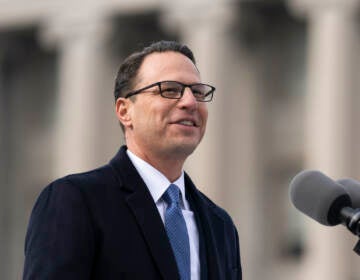Personal account of sexual harassment in Pa. Capitol spurs others to share stories
Philadelphia Inquirer reporter Angela Couloumbis, who covers state government in Harrisburg, wrote a first-person account of how men behave around her in the Capitol.
Listen 6:29
A man walks down a hall toward the light of the Capitol rotunda, in Harrisburg, Pa. (AP Photo/Carolyn Kaster)
Stories are surfacing about workplace misconduct and sexual harassment claims within Pennsylvania state government agencies and at the Capitol building in Harrisburg. They include allegations against powerful men that they’ve touched, texted, or spoken to women who work with them, or around them, in sexually deliberate or sexually suggestive ways.
Since 2005, Philadelphia Inquirer reporter Angela Couloumbis has covered state government in Harrisburg. In October, she wrote a first-person account of how she was treated by powerful men on her beat. It’s not always in a respectful, professional way.
After reading her account, dozens of women with ties to the Capitol have told Couloumbis about their stories — but only off the record.
Couloumbis recently spoke with WHYY’s “Morning Edition” host Jennifer Lynn about this.
—
For listeners who have not read your first-person account, would you mind outlining it a little bit for them and telling us why you put this out in print?
I wrote it in late October after the Harvey Weinstein scandal broke, and what we started seeing in state capitals across the country were women coming forward and saying that the political culture is really awful for women at times.
And they were describing these very difficult and horrifying experiences they had had working in the political world in these state capitals. And I was a little taken aback by the fact that, in Pennsylvania, there was just silence. Nobody said a word. And I thought, perhaps I should share some of the run-ins that as a reporter I have had with male legislators and some of my impressions of what I saw when I first began working up here.
And what happened to you? I had read that a lawmaker was criticizing some of your reporting, saying to you something to the effect of: Well, you’re reporting this because you don’t get enough sex.
Yes. It was a legislative leader who said that to me. I was stunned. Although at the time, I also was not that surprised, because I had been working up here for a couple of years when that happened. And I had kind of seen that this place operates a little differently than the other places where I’ve worked. But I thought to myself at the time, if you as a legislator are saying that to me, you would think that there would be a fear that I would quote you or somehow put that into the newspaper.
If you’re doing that to a reporter, what are you doing to other women, the lobbyists who work in the state Capitol, or even the females on your staff?
And why didn’t you put it in quotes in print?
It’s a great question. I mean the story I was writing had nothing to do with the issue of sex, so it would have been a bit irrelevant. And you’re always taught that, as a reporter, you don’t interject yourself into these stories.
Your first-person writing motivated many women to contact you about workplace misconduct and sexual harassment that they’ve encountered. And 99.99 percent of the time, they won’t let you put their name in print for fear of losing their jobs. Is that correct?
That’s correct. And that’s a difficult dynamic, because a lot of their stories are very potent and are very important and, in many respects, really should be publicized. But there is very much a fear as a woman that if you speak out you will be ostracized at best, and at worst you will lose your job.
I’m thinking there must be some kind of zero-tolerance policies in place for lawmakers and other government workers to abide by. Do these policies give women some power to make claims against men when they can and when they’re willing to?
In the Legislature, each chamber has its own set of policies, which make it a little difficult. And in one chamber, in the House, the Democrats have a different policy than the Republicans, but they set a process for what somebody can do to report instances of workplace harassment.
Do you think they’re very effective? I know there’s some movement to give them a little more backbone by getting rid of some nondisclosure clauses.
Whether they are effective or not is, I think, still under debate. I do think some of the women I have spoken to have felt that when they have come forward to jump-start the process, they feel that they have been discouraged from really taking it through formal channels and filing written reports and such, and, instead just trying to deal with it in-house.
So you can have the best policies in the world on the books, but if you don’t create an atmosphere where you have women feel comfortable bringing these types of claims and trying to have their problems resolved, you’re not going to be solving the problem.
Having said that, there are several pieces of legislation that are looking at doing away with these nondisclosure clauses when there are monetary settlements and workplace harassment instances. And that has come to be, and it has come under the spotlight even more so after various news organizations — including the Inquirer — have put in Right to Know requests asking for monetary settlements that have been paid out over the years.
And what we’re finding is that they’re often cloaked in secrecy, and, even through a Right to Know request, you really can’t get much information about what the allegations were or even who they were against.
How important is it for the public to understand details of these cases?
I think it’s very important, particularly when it comes to public officials. At its core, the Capitol is a workplace, and there are going to be workplace issues, just like there are in other workplaces around the country. But how their public officials, man or woman, are acting in their official capacity, the public does deserve a right to know.
WHYY is your source for fact-based, in-depth journalism and information. As a nonprofit organization, we rely on financial support from readers like you. Please give today.





